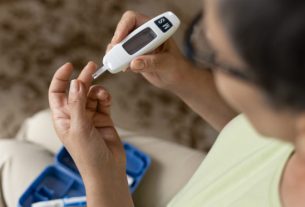Emotional dependence is a disorder where a person needs to be in a relationship to feel good and, in the absence of a partner, may present symptoms such as insomnia, anxiety and increased heart rate.
Furthermore, a person with emotional dependence, which is part of Dependent Personality Disorder (DSM-V), may also experience excessive jealousy, sadness, anger, constant fear of loneliness or rejection.
When presenting signs that may indicate emotional dependence, it is important to consult a psychiatrist or psychologist, who will evaluate the signs and symptoms presented and indicate appropriate treatment, which may include psychotherapy and, in some cases, the use of medication.

How to identify emotional dependence
The main characteristics of a person with emotional dependence are:
- Excessive jealousy or possessiveness;
- Believing that life has no meaning without a partner;
- Constant fear of loneliness;
- Excessive care and attention towards the partner;
- Difficulty making important decisions in the relationship;
- Belief that happiness can only be achieved in a relationship;
- Low frustration tolerance;
- Impulsiveness;
- Mood changes;
- Difficulty disagreeing with people, for fear of disapproval or loss of support;
Furthermore, a person with emotional dependence may also show signs of withdrawal when they spend time alone, such as a feeling of emptiness, anxiety, sadness, insomnia, increased heart rate and muscle tension.
Possible causes
The main factors that can cause emotional dependence are:
- Low self-esteem;
- Abandonment by father or mother during childhood;
- Insecurity;
- Lack or excess of care in childhood.
Although it is much more common in women, men can also experience emotional dependence.
How to confirm the diagnosis
To confirm the diagnosis of addiction, the psychiatrist or psychologist evaluates the signs and symptoms presented and the person’s health history.
Taking care of your health has never been easier!
To confirm the diagnosis, the doctor will also apply the Emotional Dependence Questionnaire (CDE), to identify the symptoms of emotional dependence.
What is the treatment like?
The recommended treatment for emotional dependence is psychotherapy, which is a set of psychological strategies and techniques, such as cognitive behavioral or psychodynamic therapy, carried out by a psychologist or psychiatrist, which help the person deal with emotions and feelings. Find out more about psychotherapy.
In addition, the psychiatrist may also recommend the use of some medications, such as fluoxetine, sertraline, paroxetine and escitalopram, which can help treat other conditions that may be present in emotional dependence, such as anxiety or depression.
Bibliography
- American Psychiatric Association. Diagnostic and Statistical Manual of Mental Disorders: DSM-5. 5.ed. American Psychiatric Association, 2013.
- FEDERAL RURAL UNIVERSITY OF AMAZÔNIA. Booklet with guidance on emotional dependence. 2021. Available at: <https://parauapebas.ufra.edu.br/images/Cartilha_Dependncia_EmocionalPsis.pdf>. Accessed on March 6, 2023
- MEDLINE PLUS. Medical Encyclopedia: Dependent personality disorder. Available at: <https://medlineplus.gov/ency/article/000941.htm>. Accessed on March 6, 2023
- FONSECA, N, Patrícia et al. Psychometric evidence from the Emotional Dependence Questionnaire. Psychological Assessment. Vol.19. 1.ed; 67-77, 2020

Sign up for our newsletter and stay up to date with exclusive news
that can transform your routine!
Warning: Undefined array key "title" in /home/storelat/public_html/wp-content/plugins/link-whisper-premium/templates/frontend/related-posts.php on line 12
Warning: Undefined array key "title_tag" in /home/storelat/public_html/wp-content/plugins/link-whisper-premium/templates/frontend/related-posts.php on line 13




